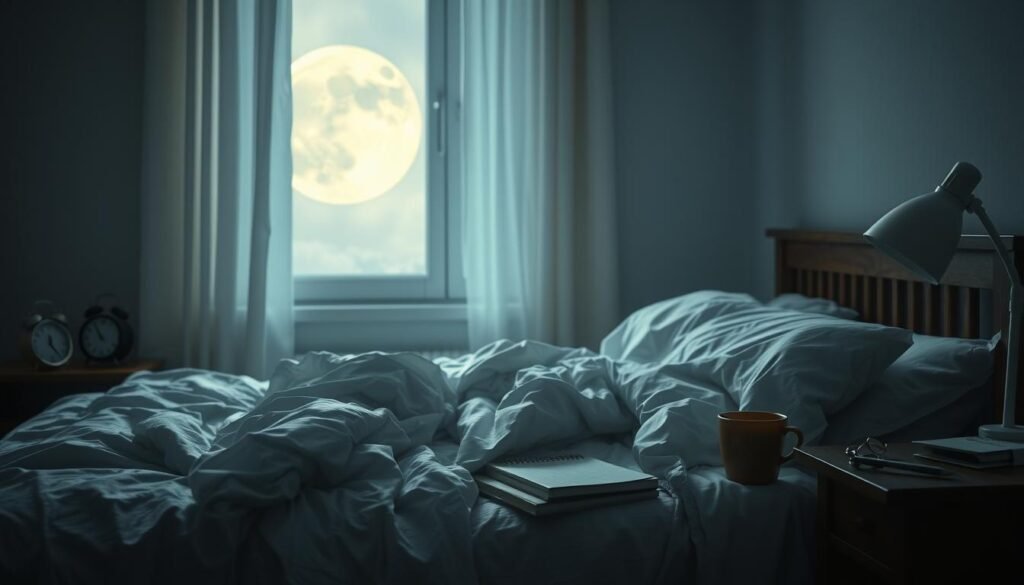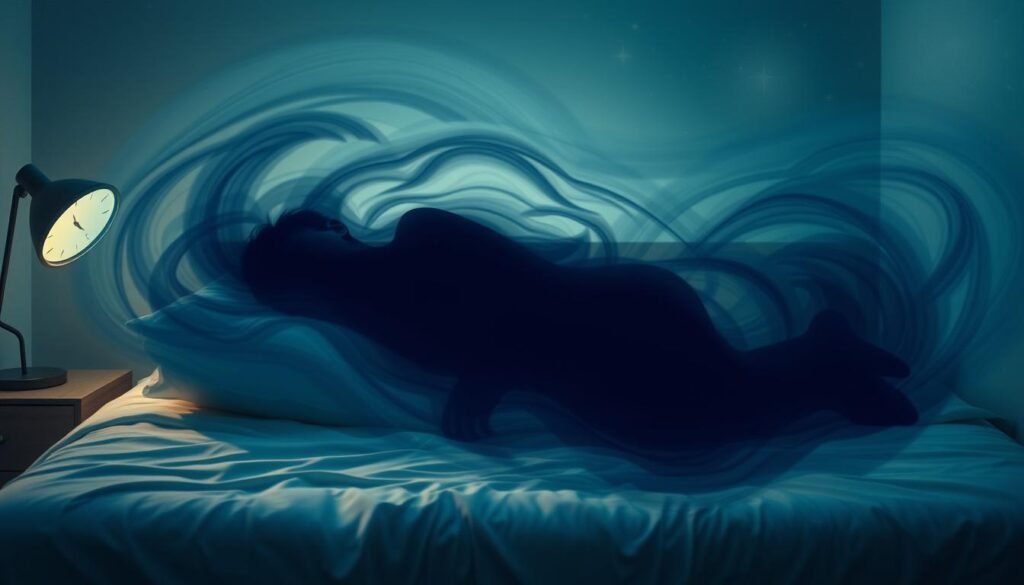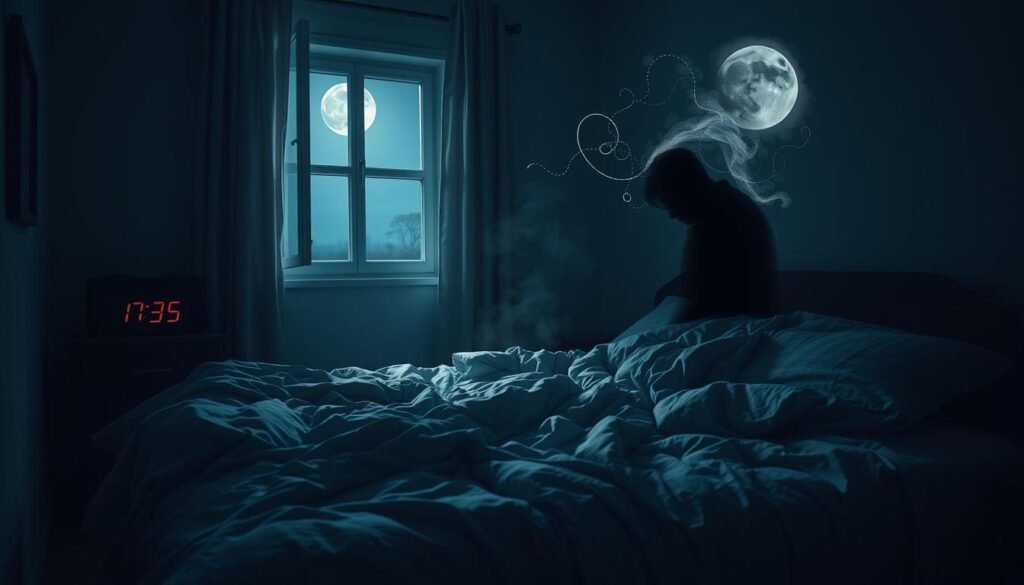Anxiety disorders are a big problem, affecting 40 million adults in the United States. This makes it the most common mental health issue. Many find it hard to sleep well because of this. At night, worries can grow, making the heart race and cortisol levels go up. This bad loop of anxiety and not sleeping well makes each problem worse. It’s very important to learn how to handle stress and use relaxation techniques for better sleep. Below are several tips for fighting insomnia caused by anxiety.
Key Takeaways
- Anxiety affects about 40 million adults in the U.S, significantly impacting their sleep.
- Sleep deprivation can lead to severe health risks, including anxiety and depression.
- Creating a calm sleep environment is essential for better sleep hygiene.
- Practicing relaxation techniques can effectively alleviate symptoms of anxiety.
- Establishing a consistent sleep schedule supports the body’s natural circadian rhythm.
- Aromatherapy and soothing sounds can enhance sleep quality for anxious individuals.
The Connection Between Anxiety and Sleep Disorders
Many adults in the United States struggle with anxiety disorders. About 20% face these challenges, leading to problems like sleep disorders. Insomnia is a common issue, making it hard to fall or stay asleep. Anxiety makes this worse.
The link between anxiety and sleep issues is complex. The amygdala, an emotion-processing part of the brain, is key. High anxiety levels disrupt sleep. This causes a cycle where anxiety blocks relaxation, worsening sleep problems.
Studies show many with insomnia also have anxiety disorders. Rates of anxiety in those with insomnia are between 24% and 36%. Disorders like Generalized Anxiety Disorder, Panic Disorder, and PTSD often include sleep issues. Especially, over 90% of those with PTSD from military combat face insomnia.
The connection between obstructive sleep apnea (OSA) and anxiety is strong. People with OSA often have more mental health problems, including anxiety. This shows why it’s crucial to treat anxiety disorders to boost sleep quality and health.
| Anxiety Disorder | Prevalence (%) | Population Affected |
|---|---|---|
| Generalized Anxiety Disorder (GAD) | 3.1% | 6.8 million |
| Panic Disorder | 2.7% | 6 million |
| Social Anxiety Disorder | 7.1% | 15 million |
| Specific Phobias | 9.1% | 19.3 million |
| Obsessive-Compulsive Disorder (OCD) | 1.2% | 2.5 million |
| Post-Traumatic Stress Disorder (PTSD) | 3.6% | 7.7 million |
| Anxiety disorder in insomnia | 24% – 36% | N/A |
Understanding Anxiety and Its Impact on Sleep
In the U.S., many people of all ages face anxiety disorders. These conditions greatly affect sleep, causing issues like insomnia. This results in poor sleep and feeling tired during the day. The body’s response to anxiety involves an overactive amygdala, which senses danger and disrupts sleep.
Not getting enough sleep can lead to serious health problems, including obesity and heart disease. For those with anxiety, it also makes their symptoms worse. This can start a cycle where managing anxiety and sleep becomes hard. Emotional and sleep regulation areas in the brain also play a part in worsening anxiety.
Chemical imbalances in the brain can increase anxiety and disturb sleep. For example, Generalized Anxiety Disorder involves constant worry that affects sleep. Panic disorder and social anxiety disorder also harm sleep. But, with treatment, many see their anxiety symptoms improve quickly.
Sleep issues should be a key focus in treating anxiety. Better sleep can greatly lessen anxiety symptoms. For tips on dealing with anxiety and sleep problems, it’s wise to seek expert advice. Click on this link for more info.

Common Sleep Disorders Linked to Anxiety
Understanding how sleep disorders and anxiety are connected can provide insights into mental health. Many adults struggle with insomnia, with about one-third facing it worldwide. This shows a significant concern about difficulties related to sleep.
Insomnia means having trouble getting or staying asleep at least three nights a week for three months. It is often linked with anxiety disorders. For example, people with acute insomnia might develop a strong fear of not being able to sleep. This fear, or somniphobia, can come from ongoing nightmares or fears of dying in sleep.
Nocturnal panic attacks are another issue that anxiety can cause during sleep. People wake up terrified, with a fast heartbeat and intense fear, making them afraid to sleep again. Sleep apnea is also linked with anxiety and panic disorders. Research shows that obstructive sleep apnea increases the risk of these conditions.
The following table shows some common sleep disorders and how anxiety affects them:
| Sleep Disorder | Associated Anxiety Features |
|---|---|
| Insomnia | Fear of falling asleep, chronic tension, and heightened anxiety at bedtime. |
| Nocturnal Panic Attacks | Intense fear with symptoms like fast heartbeat and sweating. |
| Sleep Anxiety | Worrying about the quality of sleep, leading to avoiding bedtime. |
Sleep problems often point to anxiety disorders. Recognizing and treating them early is crucial. Treatment might include therapy or medications for sleep and anxiety. Knowing this link can help people improve their mental and sleep well-being.

Recognizing Symptoms of Anxiety Affecting Sleep
Symptoms of anxiety often disturb sleep, creating a cycle of insomnia. People usually have thoughts that keep them awake. Physical symptoms like a fast heartbeat can make this worse. This makes getting good sleep hard, affecting mental health.
It’s important to recognize these symptoms to help with mental health awareness. This understanding can help in managing anxiety better. Many with insomnia also deal with anxiety disorders. About 24% to 36% may have conditions like generalized anxiety disorder (GAD) or panic disorder. This shows how closely anxiety and sleep disruption are linked.

Trauma and big life changes can make insomnia worse. Therapies like cognitive behavioral therapy (CBT) and mindfulness can help. Regular exercise is also good for improving sleep and reducing anxiety symptoms. Relaxation methods, like deep breathing, help with stress and sleep.
Knowing about sleep anxiety is the first step to better health. It’s key to use resources for handling anxiety-related insomnia. Find helpful tips for better sleep here.
Relaxation Techniques to Combat Anxiety
Anxiety can really affect how well you sleep. It’s key to find ways to relax. Techniques like breathing exercises and muscle relaxation help a lot. They make you calm and ready for a good night’s sleep. Trying things like breath control can really help with sleep.
Breath Control Techniques
Breath control is a simple but powerful way to calm down. The 4-7-8 breathing method is great for this. You breathe in for four seconds, hold it for seven, then breathe out for eight. This method helps your body relax deeply. It lowers stress and helps you fall asleep quicker.
Progressive Muscle Relaxation
Progressive muscle relaxation is also great for easing anxiety. You tense and then relax your muscles one by one. Doing this for 20 to 25 minutes daily can cut down stress. It helps you be more in tune with your body. This practice makes it easier to relax and sleep better. Using these methods regularly works best for calming your mind and body.
Building a Sleep Routine for Better Sleep Hygiene
A good sleep routine is crucial for better sleep hygiene and to avoid insomnia. Having a regular bedtime helps our bodies get used to a sleep schedule. This makes falling asleep easier. Experts agree that better sleep hygiene is an important health step for Americans with no big costs or risks.
Start your sleep routine by relaxing 30 minutes before bed. Activities like reading or relaxation techniques help calm your mind. Avoiding screens during this time is also important. The blue light from devices can mess up your sleep.
Along with a regular wake-up time, nighttime habits can also improve sleep. Light snacks or herbal teas before bed are soothing. Keeping your bedroom cool and comfortable, between 60 and 67°F, is also key for a good night’s sleep.
Here is a summary of effective practices:
| Practice | Description |
|---|---|
| Consistent bedtime | Go to bed at the same time each night to promote a natural sleep rhythm. |
| Winding down | Engage in calming activities, avoiding screens at least 30 minutes before sleep. |
| Bedroom environment | Keep your bedroom cool, dark, and comfortable to enhance sleep quality. |
| Exercise | Regular aerobic activity can improve sleep duration and quality. |
| Avoiding stimulants | Limit caffeine intake in the afternoon and evening; be cautious with nicotine and alcohol. |
| Natural light | Get exposure to natural light during the day, which can help regulate sleep cycles. |
Creating a personalized bedtime routine can lead to better sleep. This helps strengthen the link between bed and sleep, improving your rest and well-being greatly.
Creating a Calm Sleep Environment
A peaceful sleep environment is key to good rest and low anxiety. Making a calming space helps you relax and sleep better. It’s important to think about many things to make this perfect atmosphere.
- Room Temperature: Keeping the room at about 65°F (18°C) makes a comfy place to sleep well.
- Blackout Curtains: Blackout curtains block outside light, making the room dark and telling your body it’s sleep time.
- Noise Management: Loud noises can ruin sleep. Using white noise machines or earplugs helps keep things quiet for a good sleep.
- Bedding Comfort: Picking comfy bedding, like good pillows and a quality mattress, helps you sleep better. The right bedding also eases anxiety symptoms, helping you relax.
- Lighting: Making bedroom lights softer helps get your body ready for sleep. Dim lights tell your body it’s time to rest.
- Declutter: A clean room makes you feel better. Less clutter means more mental peace and less anxiety, which helps in sleeping better.
To sum it up, the right sleep space can majorly boost sleep quality and cut down anxiety. Focusing on creating a soothing space that includes these factors leads to more refreshing sleep.
Strategies for Managing Stress Before Bedtime
Managing stress before bed makes your sleep space calm. Light exercises in the evening can ease tension. Mindfulness and deep breaths help calm the mind, making it easier to relax. Setting calm evening routines greatly improves sleep.
Limiting screen time is key to readying your body for rest. Device screens can mess with your sleep hormone, making sleep hard. Switching to reading or peaceful music instead can make bedtime more relaxing.
Having a nightly routine can fight insomnia. A warm bath can relax you, helping your body ease into sleep. Drinking teas like chamomile can also calm your mind.
Sticking to a sleep schedule is crucial for stress management. Sleeping and waking at regular times tunes your body’s clock, boosting sleep quality. Facing worries during daytime, maybe by listing tasks, means less stress at bedtime.
| Strategy | Description | Benefit |
|---|---|---|
| Light Evening Exercise | Gentle stretching or yoga | Promotes relaxation and prepares the body for rest |
| Mindfulness Meditation | Focusing on breathing and present moments | Reduces anxiety and stress levels |
| Warm Bath | Taking a bath to acclimate body temperature | Induces relaxation and encourages sleepiness |
| Consistent Sleep Schedule | Going to bed and waking up at the same time | Enhances sleep quality over time |
| Reduce Screen Time | Avoiding devices before bed | Minimizes blue light exposure and helps prepare for sleep |
| Journaling | Writing down thoughts to clear the mind | Helps reduce stress and prevents racing thoughts |
Easing Anxiety and Falling Asleep: Tips for Better Sleep
Mindfulness meditation is gaining attention for tackling anxiety and boosting sleep quality. Practicing meditation, like guided imagery, shifts focus from stress. This shift promotes relaxation. Peaceful thoughts help reduce anxiety and prepare the mind for sleep. Mindfulness soothes the mind and eases body tension linked to anxiety. This makes falling asleep easier.
Mindfulness Meditation Practices
It’s vital to look at how screen time affects sleep. Screens emit blue light, disrupting our sleep cycles. Less screen time at night boosts melatonin, aiding sleep. Cutting back on gadgets an hour before bed enhances sleep quality. This is crucial for those struggling with anxiety.
Limiting Screen Time Before Sleep
Using mindfulness and reducing screen time offers a balanced way to handle anxiety and sleep better. Good sleep habits are important too. They include a steady sleep schedule and a calm bedtime routine. Focusing on sleep health can lessen anxiety and improve our overall well-being.